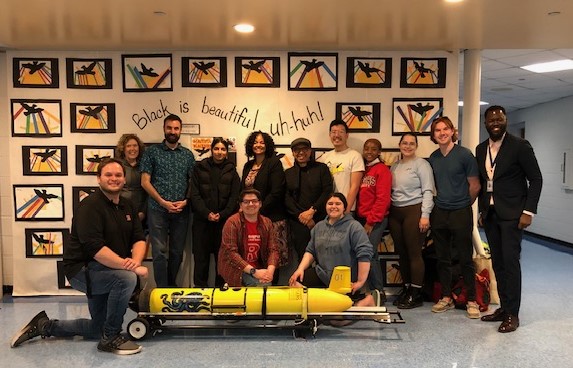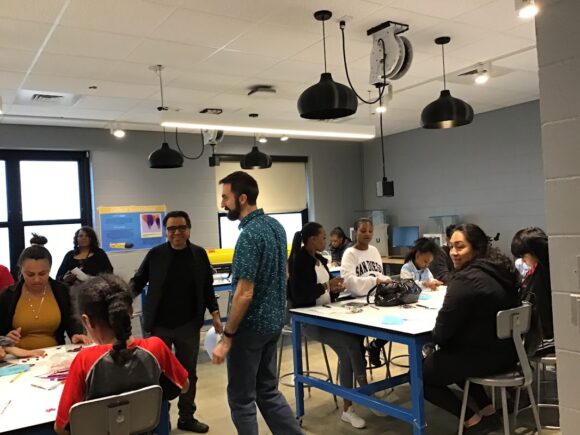
Rutgers University and McKinley Community School co-developed a Family Science Night on April 18, 20204. Standing, L-R: Janice McDonnell, Sage Lichtenwalner, Himani Vaid, Dr. Janene Rodriguez (McKinley Community School Principal), Dr. Javier Zavala- Garay, Michael Chen, Mya Sharpe, Joelle Reich, Jake Kuenzli, Mr. Kevin Jardio (McKinley Community School Vice Principal). Kneeling, L-R: Trevor Barry, Austin Grubb, and Shea Cinquemani.
On April 18, McKinley Community School in New Brunswick welcomed 11 undergraduate students, graduate students, staff and faculty from Rutgers University in a night of STEM learning. This program was designed to inspire and engage the next generation of science-informed students and to break down barriers to science learning and engagement through a fun family event.

Dr. Javier Zavala-Garay work with McKinley Community School parents and students to explore how scientists collect data.
A team led by research faculty member Javier Zavala-Garay of the Department of Marine and Coastal Sciences (DMCS), engaged with more than 180 students and their families in hands-on activities around climate change. One such activity was the Carbon Cycle game, where kids made a carbon “bracelet or keychain” to build their understanding of the Earth’s carbon cycle. Students also played the Fish Migration game, which is a human board game designed to help kids understand the impact of warming waters in the north Atlantic. Other stations included one on the impacts of climate change where families conducted simple demonstrations to understand glacier melt and sea level rise and the impacts of climate change here in New Jersey. Using M&Ms, kids also learn how scientists collect/analyze data.
The department also had an ocean glider from the Rutgers University Center for Ocean Observing Leadership (RUCOOL) on hand as an example of an oceanographic data collection tool. Finally, DMCS presented a Carbon Footprint activity, a craft activity to help kids talk about their carbon footprint and how we can fight climate change and be more sustainable.
Local students from P-Tech High School also partnered with the team, providing bi-lingual student volunteers to assist with translations for the families and support their younger community members in STEM learning. These students engaged in community service, which is highly valued by the school and community.
Zavala-Garay has been a research scientist in DMCS for 18 years, and is a strong supporter of the department’s outreach program. He’s participated in the 4-H STEM Ambassador program, serving as a research role model in on-campus activities and events.
“Participating in the family science night was important for me because, given my own life experience as a son of a very low-income family in Mexico, I feel I can recognize how crucial and valuable role models can be in low-income communities.”

Rutgers scientists, parents and students interact during Family Science Night at McKinley Community School.
From his experience with working with local communities, Zavala-Garay has found that “there is a lot of interest in learning more about how the ocean works. This gave me a lot of hope and motivates me to try to find ways to interact more with the local community in order to promote and support young diverse youth in pursuing a major in oceanography or any other major in the STEM field.”
Dr. Janene Rodriquez, Principal of McKinley Community School, is busy addressing the New Jersey Department of education’s recently established and first-in-the-nation State Standards on Climate Change for grades K-12. The standards were issued by first lady and Governor Murphy in 2023 to prepare students to understand how and why climate change happens, the impact it has on our local and global communities and how we can act in informed and sustainable ways.
Principal Rodriguez notes that “the partnership with Rutgers for this Joint Family Science Day event on climate change was significant. We not only nurture scientific curiosity, but also foster a sense of collective responsibility towards our planet. More importantly, we empower our families to become stewards of environmental sustainability, ensuring a brighter future for generations to come.”
Scientists at the Department of Marine and Coastal Sciences and educators in the Department of 4-H Youth Development are scaling up efforts to collaborate and partner with schools, in our university mission to provide quality STEM education and inspire a new generation of STEM-informed and STEM-interested young people.

